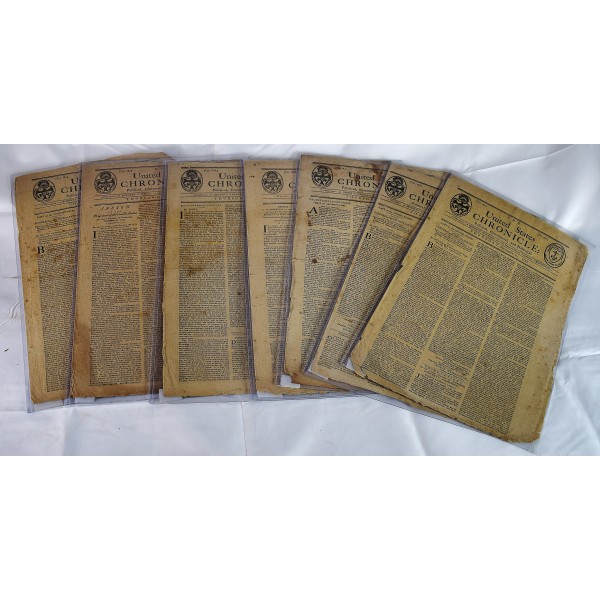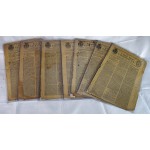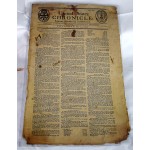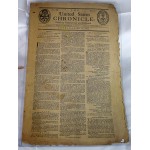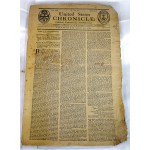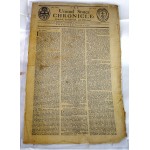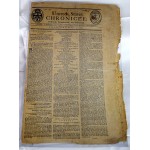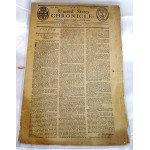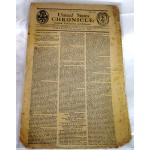United States Chronicle. Providence [Rhode Island]. 7 issues: November 3, 1791; May 17, May 31, August 2, August 30, September 6, and November 22, 1792 (Early American Newspapers).
United States Chronicle. Providence [Rhode Island]. 7 issues: November 3, 1791; May 17, May 31, August 2, August 30, September 6, and November 22, 1792 (Early American Newspapers).
Bennett Wheeler
Providence: Bennett Wheeler, 1791
Collection of 7 issues from the United States Chronicles from the years 1791 and 1792. Unbound. Housed in thick mylar plastic sleeves. Tanning and minor soiling and foxing to pages. Minor chipping to edges. George Washington signature in letterpress in the State of the Union issue. The United States Chronicle was an early Rhode Island weekly, published between 1784 and 1804. Its publisher, Bennett Wheeler was born in Halifax, Nova Scotia in 1754. Wheeler served in the Revolution in the Continental Army as an 18 year old. He established himself as a printer and newspaper man in Providence. "The United States Chronicle was the second newspaper...published in Providence." - Publications of the Rhode Island Historical Society, Vol. VI, July 1898, No. 2.
Notable entries in this collection are: May 17th 1792 issue: April 14, 1792: Apportionment Act of 1792, Sess. 1, ch. 23 1 Stat. 253, increased the size of the House of Representatives from 69 seats in the 2nd Congress to 105 in the 3rd and apportioned those seats among the several states according to the 1790 Census. .
Earlier apportionment legislation had been approved by the House in February 1792 and the Senate in March 1792, but was vetoed by the President on April 5, 1792. It was the first presidential veto of legislation in American history. Washington made two objections in a letter to the House describing the reason for his veto. The first objection made in the letter was that the bill did not have a uniform ratio to reach the numbers of representatives to population set forth in the bill. Secondly, the bill "allotted to eight of the States more than one for every thirty thousand" as delimited by Article I Section II of the United States Constitution.
Congress, after receiving Washington's veto message, the first in U.S. history, threw out the original bill and decided, on April 10, 1792, to apportion representatives at "the ratio of one for every thirty-three thousand persons in the respective States."
May 2, 1792 issue: First Militia Act of 1792, Sess. 1, ch. 28, 1 Stat. 264, empowered the president to call out the militias of the various states in the event of an invasion or rebellion. The authority to call forth the militia was first invoked by George Washington to put down the Whiskey rebellion in Western Pennsylvania in 1794, just before the law granting that authority expired. Congress quickly passed the Militia Act of 1795, which by and large mirrored the provisions of the 1792 Act.
August 30, 1792 issue: The process act of 1792. The Process Act of 1792 authorized the federal courts to write their own procedural rules for everything but actions at law.
Sept. 6, 1792 issue: Act making alterations in the Treasury and War Departments, May 8th 1792
Nov. 22, 1792 issue: President George Washington's fourth State of the Union Address.
His fourth State of the Union address, delivered only days before the election, gives insight into his priorities for a second term. Washington devotes nearly half of his fourth State of the Union, delivered on November 6, 1792, to relations with Native American tribes. He also discusses the establishment of the Mint, early opposition to the "Whiskey tax" the operation of the Post Office, and the adoption of a constitution by Kentucky, which had been admitted to the Union as the fifteenth state on June 1.
Additional articles include shipping news, book reviews and local want and trade adverts on final leaves. Brigham p. 1017-1019.
